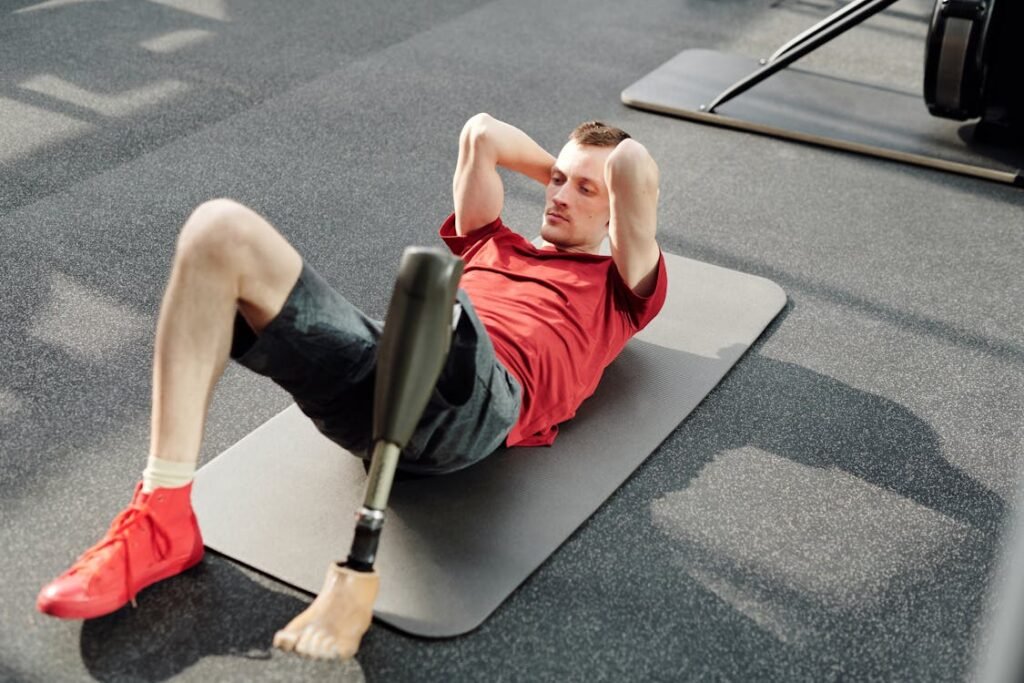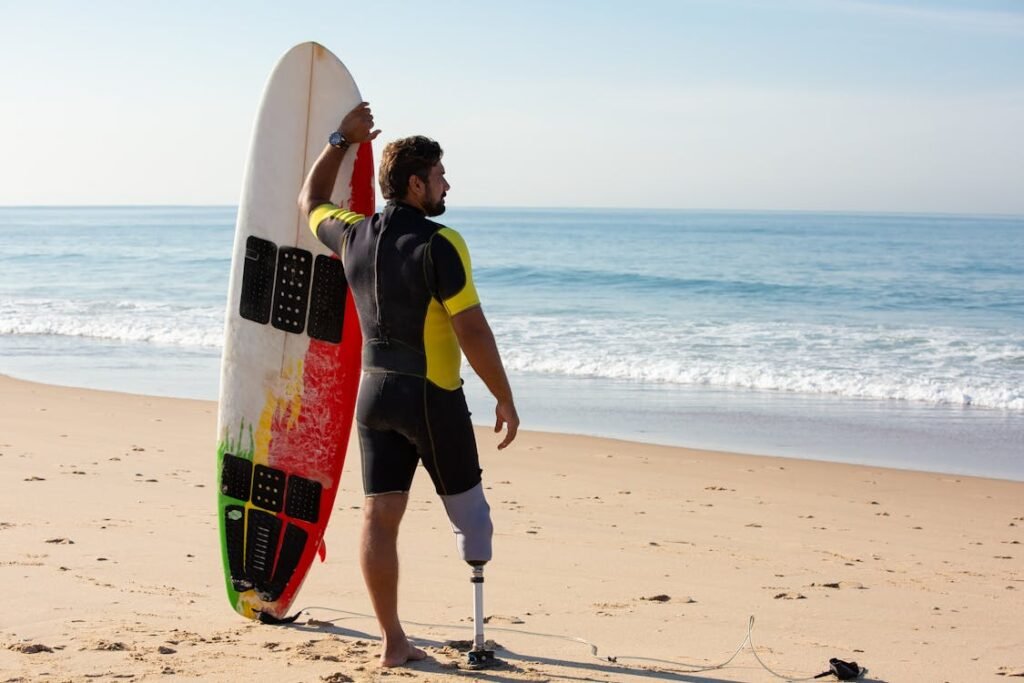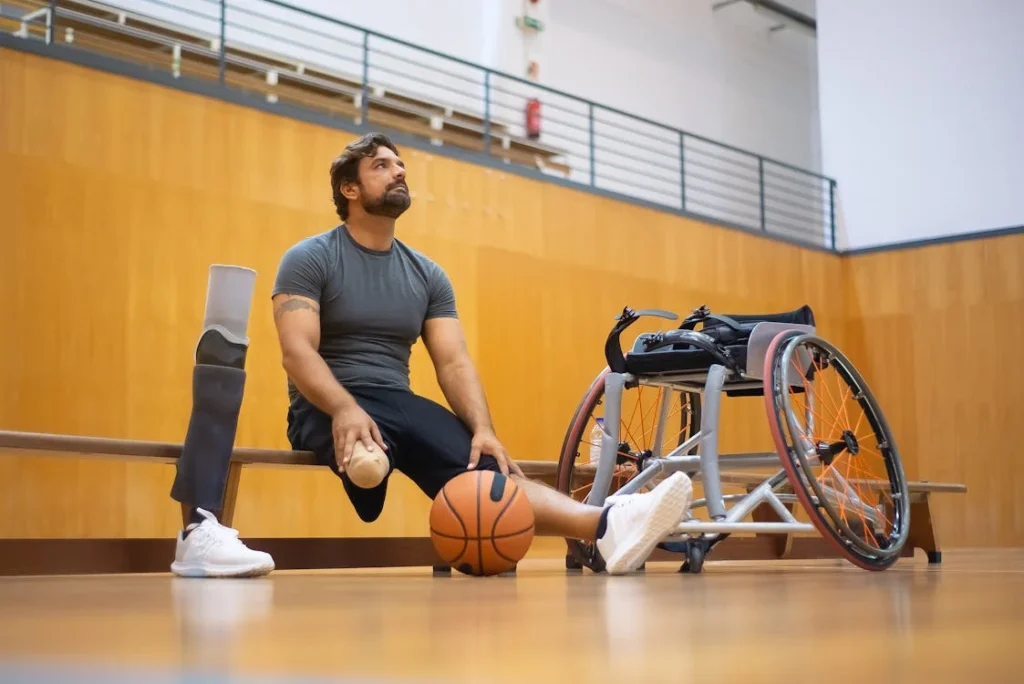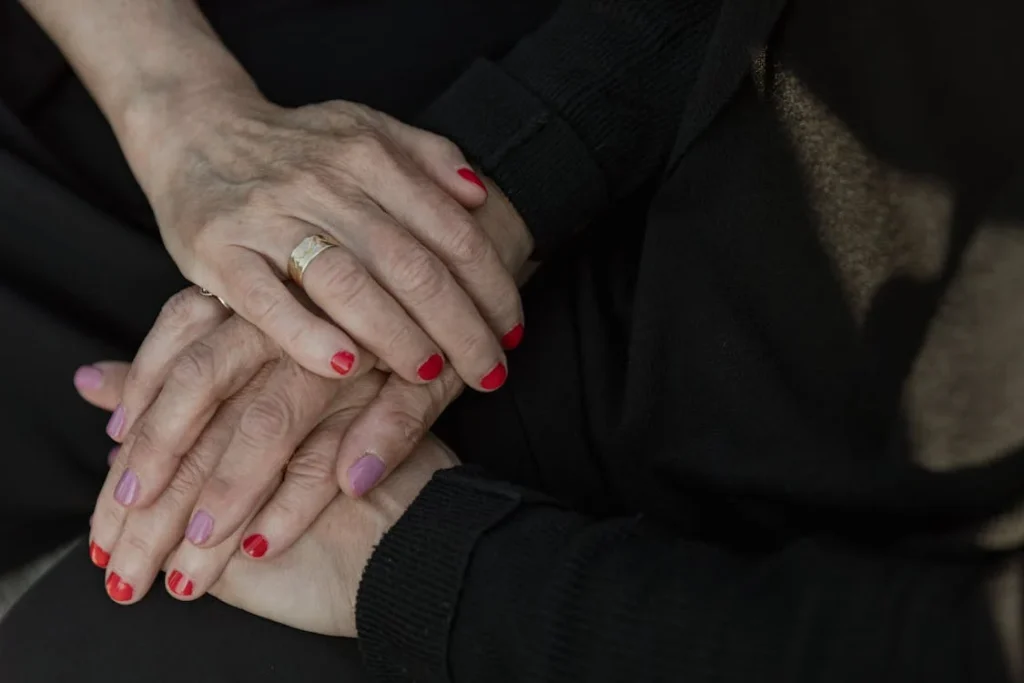Losing a limb is a life-changing experience. It can feel overwhelming, and adjusting to a new way of living takes time. However, life does not stop after limb loss. It changes, but it also opens doors to new possibilities. Setting personal goals is a powerful way to regain confidence, independence, and a sense of purpose.
Whether you want to return to work, take up a new hobby, improve mobility, or build strength, setting the right goals will help you move forward. But goal-setting is not just about making a wish list. It’s about creating a clear plan, staying motivated, and celebrating every step of progress.

Finding Your Motivation After Limb Loss
Adjusting to life after limb loss is not just about physical recovery. It is also about finding the inner strength to move forward. The first step to setting and achieving goals is understanding why they matter to you.
Motivation is deeply personal. Some people are driven by the desire to regain independence, while others find strength in family, work, or hobbies.
Think about what truly matters to you. Maybe you want to walk again without assistance, return to your favorite sport, or simply regain confidence in daily activities. Whatever it is, recognizing your motivation will help you push through difficult moments.
It is normal to feel a mix of emotions. Some days, you may feel strong and determined, while on others, frustration and doubt may creep in. This is completely natural.
Acknowledging these emotions is important, but they should not define your journey. Focus on what excites you about the future rather than what has changed in the past.
Setting Realistic and Meaningful Goals
Once you have a clear idea of your motivation, the next step is to set realistic and meaningful goals. A good goal is one that challenges you but is also within reach. The key is to start with something that feels achievable and then build on it.
For example, if you are learning to use a prosthetic limb, setting a goal to walk a certain distance every day is a good place to begin. If your goal is to return to work, you might start by improving your typing speed or practicing tasks that require fine motor skills.
The more specific your goal is, the easier it will be to track progress.
Breaking big goals into smaller steps makes them less intimidating. Instead of focusing on the final outcome, focus on what you can do today, this week, or this month. Every small achievement adds up and brings you closer to success.
Overcoming Mental Barriers
Fear and self-doubt are common after limb loss. You might wonder if you will ever regain your independence or do the things you love again. These thoughts can be discouraging, but they do not have to hold you back.
One way to overcome mental barriers is to reframe your thinking. Instead of focusing on what you cannot do, focus on what you can. Progress may be slow at times, but it is still progress. Remind yourself that setbacks are part of the journey, not a sign of failure.
Having a strong support system can also make a huge difference. Surround yourself with people who encourage you—family, friends, support groups, or professionals who understand your journey.
Talking to others who have gone through similar experiences can provide valuable insight and motivation.

Creating a Plan for Success
Once you have identified your motivation and set meaningful goals, the next step is to create a clear plan to achieve them. A goal without a plan can feel overwhelming, but when broken down into steps, it becomes much more manageable.
Start by identifying what you need to reach your goal. If your aim is to walk comfortably with a prosthetic, you may need physical therapy, daily practice, and gradual strength-building exercises.
If your goal is to return to a specific job, consider training programs or adaptive tools that can help you perform your tasks more efficiently.
Setting a timeline for progress can keep you motivated. However, flexibility is important. Life is unpredictable, and some days may be harder than others.
Instead of feeling discouraged by setbacks, see them as opportunities to learn and adjust your approach. Consistency is key, even if progress feels slow.
Seeking Professional Guidance
While determination is crucial, professional support can make a significant difference. Rehabilitation specialists, prosthetists, and physical therapists can provide expert guidance tailored to your specific needs.
They help you adapt to new ways of moving, develop strength, and prevent potential injuries.
If you are using a prosthetic limb, working closely with a prosthetist ensures a comfortable and functional fit. At Robobionics, we provide advanced prosthetic solutions that are designed for real-life challenges.
Our team supports you through every step of the process, from selecting the right prosthetic to learning how to use it effectively. Gamified rehabilitation is another effective way to track progress while making the learning process engaging.
Building Strength and Endurance
Physical strength plays a major role in achieving independence after limb loss. If you are using a prosthetic, your body needs to adjust to new movement patterns, which requires muscle strength, balance, and endurance.
Simple exercises can help you build the necessary strength. Working with a therapist or trainer who understands limb loss can help you develop a safe and effective routine. The key is to start slow and gradually increase intensity as your body adapts.
For upper limb amputees, exercises that improve grip strength and coordination are essential. Practicing tasks such as holding objects, writing, or using tools can help regain fine motor skills.
Lower limb amputees can focus on balance training and core stability to improve mobility and confidence while walking.

Staying Motivated Through Challenges
Progress is rarely a straight line. Some days, you will feel strong and accomplished, while on others, frustration might creep in. This is completely normal. The key to long-term success is staying motivated even when things don’t go as planned.
One way to maintain motivation is by celebrating small wins. Every step forward, no matter how small, is proof that you are making progress. If you have recently started using a prosthetic hand, the first time you successfully pick up an object is a major achievement.
If you are learning to walk again, taking a few extra steps than the day before is a sign of improvement. Acknowledging these victories keeps you encouraged and helps you stay focused on your goals.
Another important aspect of motivation is patience. It’s easy to compare yourself to others or feel like you should be making faster progress.
But everyone’s journey is different. Healing and adapting take time. Give yourself the space to learn at your own pace, and don’t let setbacks define your ability to succeed.
The Role of Support Systems
Having a strong support system makes a world of difference. Family and friends can provide emotional encouragement, but connecting with others who have experienced limb loss can be especially empowering.
Support groups, both in-person and online, allow you to share experiences, gain advice, and find inspiration from people who truly understand your journey.
Mentors can also play an important role. Speaking with someone who has successfully adapted to life after limb loss can give you valuable insight and reassurance. Their experiences can serve as a reminder that challenges can be overcome, and a fulfilling life is possible.
At Robobionics, we believe that no one should face this journey alone. That’s why we provide not just prosthetic solutions, but also guidance and support to help you adjust and thrive.
If you’re looking for assistance, reach out to us today to explore how we can help you on your journey.
Finding New Interests and Passions
One of the most rewarding parts of recovery is rediscovering activities that bring you joy. Some people return to hobbies they loved before, while others find new interests that align with their current abilities.
If you were previously active in sports, adaptive sports programs can help you stay involved in physical activities.
Many organizations offer training and support for amputees who want to participate in sports such as running, swimming, or cycling. If art, music, or writing was a passion, adaptive tools and technology can help you continue expressing yourself creatively.
Exploring new interests can also boost confidence. It shifts the focus from what has changed to what is still possible. Trying something new brings excitement, a sense of accomplishment, and a reminder that life is still full of opportunities.

Overcoming Setbacks and Pushing Forward
Setbacks are a natural part of any journey, and adapting to life after limb loss is no different. Some days will feel easier than others, and unexpected challenges may arise.
What matters most is how you respond to these obstacles. Instead of seeing setbacks as failures, view them as opportunities to learn and grow.
When frustration sets in, take a step back and assess the situation. Ask yourself what went wrong and what can be adjusted. If a particular movement with your prosthetic feels difficult, perhaps a small modification or more practice is needed.
If you experience discomfort while walking, your prosthetist might need to make adjustments to improve your mobility. Every challenge has a solution, and persistence is key to finding it.
Emotional setbacks are just as real as physical ones. Feelings of discouragement, anger, or sadness may surface from time to time.
Acknowledging these emotions without letting them take over is important. Talking to someone who understands—whether a therapist, a support group, or a trusted friend—can help lighten the emotional burden.
Adapting to Change and Embracing Your New Reality
Limb loss changes certain aspects of life, but it does not define who you are. The sooner you embrace your new reality, the easier it becomes to move forward with confidence.
Acceptance does not mean giving up on what you once had; it means recognizing that while things may be different, they can still be fulfilling.
Adapting to change takes time, but having the right mindset makes a difference. Instead of focusing on limitations, shift your attention to possibilities.
Advances in prosthetic technology, rehabilitation programs, and adaptive tools have made it easier than ever for amputees to regain independence and lead active lives.
At Robobionics, we are committed to helping individuals regain control of their lives. Our prosthetic solutions, including the Grippy™ bionic hand, are designed to provide functionality, comfort, and ease of use.
If you are looking for a prosthetic solution that supports your lifestyle, book a free demo today and experience the difference firsthand.
The Importance of Self-Belief
Achieving personal goals after limb loss is not just about physical ability; it is about believing in yourself. Confidence grows with experience, and the more you challenge yourself, the stronger you become.
The road to recovery is not always easy, but each step forward is proof of your resilience.
Surround yourself with people who uplift and support you. Keep reminding yourself why you started this journey in the first place.
Set new goals as you progress, and never stop pushing yourself to explore new possibilities. Your future is still yours to shape, and with determination and the right support, there is no limit to what you can achieve.

Regaining Independence in Daily Life
One of the biggest concerns after limb loss is learning how to manage everyday tasks independently. Whether it’s dressing, cooking, writing, or using public transport, simple activities can feel challenging at first.
But with practice, adaptation, and the right tools, independence is entirely possible.
The key is to approach daily activities with patience and a willingness to experiment. If one method doesn’t work, another might. Many amputees develop creative ways to complete tasks that work best for them.
Occupational therapists can be a great resource, offering tailored strategies to help you regain control over daily routines.
Using assistive technology and prosthetics can also make a significant difference. Modern prosthetic devices, like the Grippy™ bionic hand, are designed to restore functionality and enhance ease of movement.
With time and practice, they can become a natural extension of your body. If you are curious about how a prosthetic hand can improve your daily life, schedule a free demo with Robobionics and experience it firsthand.
Navigating Social Situations with Confidence
Limb loss can sometimes bring concerns about how others perceive you. You may wonder how people will react or feel self-conscious in public. These feelings are normal, but they should never stop you from engaging in social activities or living your life to the fullest.
Confidence comes from within, but building it takes time. Start by engaging with close friends and family who make you feel comfortable. As you gain confidence in these familiar spaces, gradually expand your social interactions.
If you feel unsure about how to address questions from others, having a prepared response can help you feel more in control of the conversation.
Many people are simply curious and mean no harm. How you handle interactions can set the tone for how others perceive limb loss. If you approach it with confidence, people will follow your lead.
Remember, you are more than your limb loss—you are your personality, your skills, and your experiences.
Returning to Work and Community Engagement
Going back to work or participating in community activities is an important step toward regaining independence. Depending on your profession, you may need adaptive tools, workplace adjustments, or skill retraining.
Many companies today are more inclusive and willing to make accommodations to ensure a smooth transition.
If you are unsure about your options, vocational rehabilitation programs can help you identify career paths that match your skills and abilities. Support groups and disability rights organizations can also guide you in finding employment opportunities.
Beyond work, getting involved in community activities—whether volunteering, joining a club, or attending social events—can provide a renewed sense of purpose. Engaging with others fosters connection and reminds you that you are still an active part of society.
Strengthening Mental and Emotional Well-Being
Physical recovery after limb loss is only one part of the journey—emotional healing is just as important. Adjusting to a new reality can bring a mix of emotions, including frustration, grief, or even moments of self-doubt.
While these feelings are natural, building a strong mindset will help you move forward with confidence.
One of the most effective ways to strengthen emotional resilience is through self-compassion.
Be kind to yourself and recognize that adapting takes time. Instead of focusing on what is difficult, acknowledge the progress you’ve already made. Each small step forward is a victory worth celebrating.
Seeking professional support can also be valuable. A therapist or counselor who specializes in limb loss can help you process emotions and develop coping strategies.
Many people find that talking about their experiences—whether with a professional, a support group, or close friends—lightens the emotional burden and provides reassurance that they are not alone.
Managing Stress and Anxiety
It’s common to feel stress when adjusting to life with a prosthetic or learning new ways to navigate the world. Practicing relaxation techniques, such as deep breathing, meditation, or gentle stretching, can help manage stress and improve overall well-being.
Engaging in activities that bring joy, whether it’s music, art, or spending time in nature, also helps in maintaining a positive outlook.
Routine is another powerful tool for reducing stress. Having a structured day with clear goals creates a sense of stability and control. When you know what to expect, challenges become more manageable.
Over time, as you grow more comfortable with daily tasks, stress levels naturally decrease.
Building a Positive Self-Image
Limb loss can sometimes affect how you see yourself. The way you perceive your body and abilities can influence your confidence and interactions with others. The key to building a strong self-image is to focus on your strengths rather than limitations.
Wearing clothes that make you feel good, engaging in physical activities that boost energy, and surrounding yourself with supportive people all contribute to a healthy self-image.
Some people choose to personalize their prosthetic limb, turning it into a statement piece that reflects their personality. Others find empowerment in sharing their story, inspiring those who may be going through similar challenges.
At Robobionics, we believe that prosthetics should not just restore function but also enhance confidence. That’s why we design advanced solutions like the Grippy™ bionic hand, made to be both functional and comfortable.
If you’re looking for a prosthetic that supports your active lifestyle, reach out to us today and explore the options available to you.
Conclusion
Adjusting to life after limb loss is a journey of resilience, adaptation, and self-discovery. While challenges are inevitable, setting personal goals provides a clear path forward. Each small achievement builds confidence, proving that progress is always possible. With patience, determination, and the right support, you can regain independence and continue doing the things you love.
Embracing change and focusing on possibilities rather than limitations can transform the way you experience life. Whether it’s mastering daily tasks, returning to work, or exploring new passions, every step forward is a victory. Surrounding yourself with a strong support system, using advanced prosthetic solutions, and prioritizing mental well-being all contribute to long-term success.
At Robobionics, we are committed to empowering individuals with innovative prosthetic technology, expert guidance, and compassionate support. If you are ready to take the next step in your journey, contact us today and discover how our solutions can help you achieve your goals. You have the strength to move forward—one step at a time.




